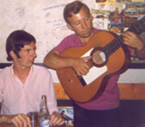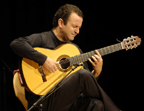Welcome to one of the most active flamenco sites on the Internet. Guests can read most posts but if you want to participate click here to register.
This site is dedicated to the memory of Paco de Lucía, Ron Mitchell, Guy Williams, Linda Elvira, Philip John Lee, Craig Eros, Ben Woods, David Serva and Tom Blackshear who went ahead of us.
We receive 12,200 visitors a month from 200 countries and 1.7 million page impressions a year. To advertise on this site please contact us.
|

|
|
Origins
|
You are logged in as Guest
|
|
Users viewing this topic: none
|
|
Login  | |
|

   
Ricardo
Posts: 14855
Joined: Dec. 14 2004
From: Washington DC

|
 RE: Origins (in reply to Jim Opfer) RE: Origins (in reply to Jim Opfer)
|
|
|
Ok. first of all, the qawwali guys are from Pakistan, not India. They are in the style of Nushfrat ali kahn. The flamenco singers are "cameroneros". If you watch the DVD that they sell, there is a documentary. You discover the frustrations that occur when trying to make such a fusion.
Problem 1. The music from pakistan is RELIGIOUS. They are having to "fuse" their religious texts with the "profane" flamenco lyrics. It is borderline "blasphemy" to the Pakistani guys.
Problem 2. The music from pakistan is MODAL in nature, where as the music of flamenco is a hybrid. The SINGING can be modal at times, but the guitar is harmonic, tonal, western. Big problems arise when you try to "harmonize" with modal music. Chicuelo was very frustrated when he realized they did not use, need, or even want to relate the two musics by "chords". The Cantaors got along just fine singing saetas or martinetes with the Pakistani singer. That is "modal". No chords. But the guitar can't match unless it too behaves "modally". Flamenco fuses better with jazz or brazillian music for this reason. It all goes right along with the discussion regarding Manolo Sanlucar's book. Modal vs tonal and the way the guitar is used.
Anyway, I love the singing of Poveda and Duquende with Chicuelo, but to be honest, the best part of this concert was to me when the two musics were separate and "pure". I love modal music, and I love just the cante with guitar. But the actual "fusion" attempt did not really work for me.
Ricardo
|
|
|
|
REPORT THIS POST AS INAPPROPRIATE |
Date Mar. 9 2007 3:56:51
 |
|
 New Messages New Messages |
 No New Messages No New Messages |
 Hot Topic w/ New Messages Hot Topic w/ New Messages |
 Hot Topic w/o New Messages Hot Topic w/o New Messages |
 Locked w/ New Messages Locked w/ New Messages |
 Locked w/o New Messages Locked w/o New Messages |
|
 Post New Thread
Post New Thread
 Reply to Message
Reply to Message
 Post New Poll
Post New Poll
 Submit Vote
Submit Vote
 Delete My Own Post
Delete My Own Post
 Delete My Own Thread
Delete My Own Thread
 Rate Posts
Rate Posts
|
|
|
Forum Software powered by ASP Playground Advanced Edition 2.0.5
Copyright © 2000 - 2003 ASPPlayground.NET |
0.046875 secs.
|


 Printable Version
Printable Version






 New Messages
New Messages No New Messages
No New Messages Hot Topic w/ New Messages
Hot Topic w/ New Messages Hot Topic w/o New Messages
Hot Topic w/o New Messages Locked w/ New Messages
Locked w/ New Messages Locked w/o New Messages
Locked w/o New Messages Post New Thread
Post New Thread